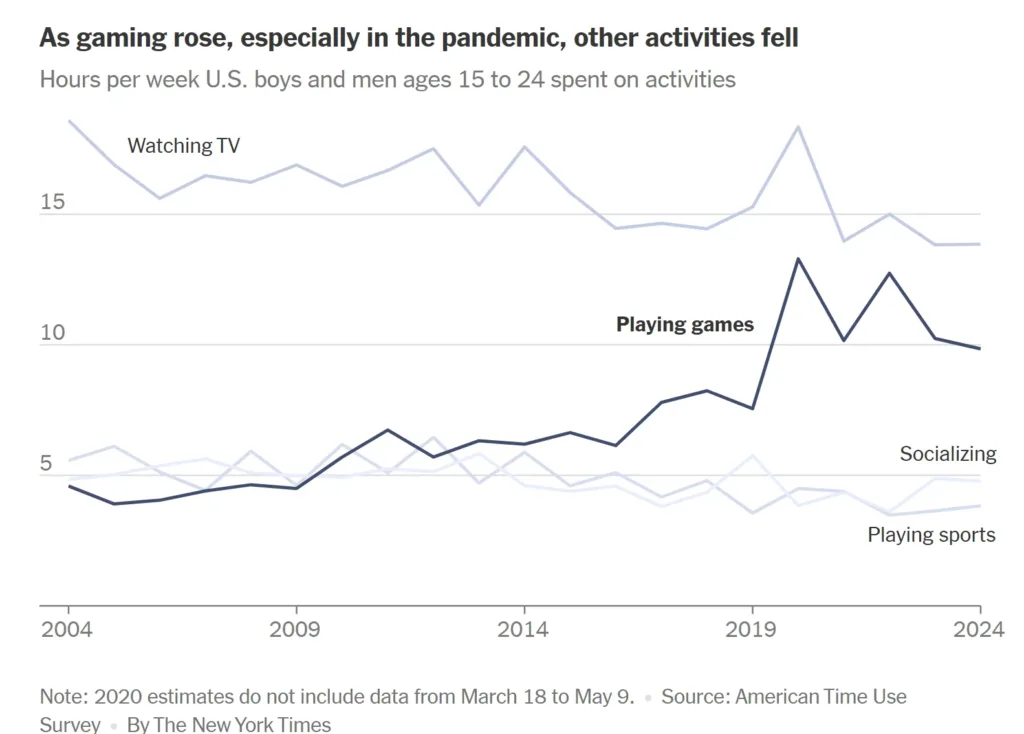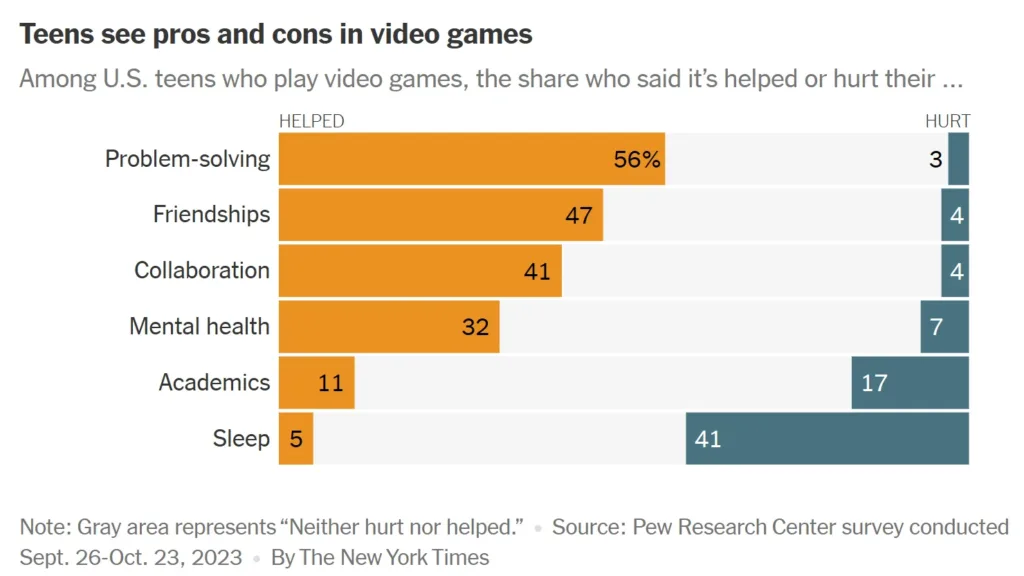Table of Contents
The Rise of Video Games and Its Effects on Boys’ Daily Lives
Video games have become a defining feature of the daily lives of boys and young men, significantly shaping their routines, social interactions, and even mental health. Over the past fifteen years, boys aged 15 to 24 have more than doubled the average amount of time they spend playing video games each week, according to a major national survey. This shift is not just about leisure—it touches on education, physical activity, socialization, and employment patterns. As representatives of Squaredtech, it’s important to analyze how video games are influencing this generation, considering both the positive aspects and the challenges.

Since the early 2000s, time spent gaming by boys and young men in the U.S. has surged dramatically, from just a few hours weekly to around ten hours per week in 2024, as found in the American Time Use Survey. This increase surpasses changes in time spent on any other activity tracked by this comprehensive government survey. The term “playing games” in the survey mostly reflects video gaming, although it may include other game types such as card or board games.
This change coincides with important technological advances. Video games have evolved from being limited to home consoles or desktop computers to being accessible on mobile devices, allowing gaming to happen anywhere and anytime. This shift makes gaming an ever-present activity, integrated into boys’ schedules rather than confined to specific times or locations.
Many parents have long raised concerns about video games, especially regarding the potential for violent content to encourage aggression—though studies have not confirmed this link. Today, concerns focus more on how much time boys spend gaming. This increase in gaming hours has coincided with declines in boys’ time spent on physical activity, in-person socializing, homework, paid work, and even sleep. For example, some educators observe that boys show reduced focus in classrooms, attributing some of these challenges to video game habits.

Susan Donohoe, an elementary schoolteacher, commented that boys often prefer immersive titles like Minecraft or Fortnite over outdoor play and household responsibilities. According to her, this preference limits real-world development in social skills and responsibility.
At the same time, researchers and teens themselves emphasize that gaming is also an important social outlet. Many boys use video games as a primary way to connect and build friendships. Annie Maheux, an assistant professor specializing in adolescent digital media, notes that the social aspect of gaming is frequently overlooked by discussions focusing solely on negative impacts.
Social Benefits and Social Costs of Video Gaming for Boys
Research from institutions like the Digital Wellness Lab at Boston Children’s Hospital offers insightful data on how teens experience gaming. Their study of 1,500 U.S. teenagers indicates that most teens play video games socially. Boys, in particular, tend to prefer interactive gaming that includes communication with friends via platforms like FaceTime or Discord, even if they do not meet physically.

This virtual socializing fulfills essential psychological needs during adolescence. According to Dr. Zhiying Yue, a scientist at the Digital Wellness Lab, gaming satisfies young people’s needs for competence (building skills), autonomy (creating and personalizing avatars), and relatedness (feeling connected to peers). These are critical developmental needs for any adolescent. Boys may be especially attracted to gaming as a way to fulfill these needs when real-world social environments feel less supportive.

Data from multiple surveys show that 97 percent of teenage boys engage in online gaming, with boys spending much more time gaming compared to girls—around 10 hours weekly versus two hours. In contrast, girls tend to be more active on social media. Boys’ gaming often involves competition and risk-taking, which science links to greater activation of the brain’s reward system in males, making video games particularly enticing to them.
Nevertheless, the social benefits come with risks. While gaming can create bonds, prolonged screen time and solitary gaming are often associated with declines in physical activity, academic performance, sleep quality, and sometimes mental health. For example, teenage boys who often game report that video games help with problem-solving and friendships but also admit negative impacts on academics and sleep.
The Pandemic Acceleration and Industry Influence on Gaming Habits
The COVID-19 pandemic intensified the time young men spent gaming. In 2022, boys aged 15 to 24 were spending an average of 13 hours a week playing video games, up from 7.5 hours in 2019. The lockdowns created a unique situation where video games provided important social connection outlets amidst isolation, helping to reduce stress and depression during particularly difficult times.
However, the increase has persisted even as normal life resumed. The gaming industry’s business strategies have played a role in this sustained engagement. Starting in the 2010s, many games shifted from upfront purchases to free-to-play models that rely on in-game microtransactions. Companies now design games to maximize daily play through frequent updates, special events, virtual goods, and ongoing rewards, making it difficult for players to stop.
Games such as Fortnite, Roblox, and Call of Duty — all multi-device and multiplayer games with free-to-play accessibility — dominate the playing habits of many boys, fueling extended gaming sessions and deep involvement.
Zach Rausch, chief researcher at the Tech and Society Lab at New York University, warns about the predatory nature of these models that seek to exploit vulnerabilities. Male players are especially at risk since competition and reward mechanisms target their brain responses more powerfully.
Parents often notice these patterns. Amy Gifford, a mother from Massachusetts, points out the social divide between her daughter who plays less and meets friends physically versus her son whose friends prefer online gatherings. This style of socialization can make traditional outdoor activities like bike riding or sports less appealing to boys.
Recommendations for Managing Gaming’s Role in Boys’ Lives
Experts interviewed by Squaredtech recognize the importance of video games as a social and developmental medium, discouraging outright bans. Instead, they suggest a balanced approach that includes parents playing alongside their children to understand the content and engage in discussions about safe gaming habits.
Monitoring screen time remains crucial, as too much time gaming can interfere with sleep, school, and physical health. Parents are encouraged to discuss the risks of addiction, exposure to harmful online behaviors, and gambling elements in certain games. Some online platforms and the video game industry—such as members of the Entertainment Software Association—offer parental controls and rating systems to help families regulate gaming.
Still, many researchers argue that relying solely on parents will not suffice. Platforms that profit from prolonged play have a responsibility to implement safeguards to protect young players from addictive mechanics and harmful content.
Conclusion
At Squaredtech, we recognize the powerful influence video games have on the lives of boys today. Video gaming supports vital social connections and developmental needs, providing skills and community for a generation still defining its place in the broader society. However, the growing time spent gaming raises concerns about physical health, academic engagement, and social skills development. Understanding this balance allows us to inform families and educators while advocating for safer gaming environments and smarter parental controls. By combining awareness, guidance, and industry responsibility, we can support boys in enjoying the benefits of gaming without sacrificing their well-being.
More News: Gaming


